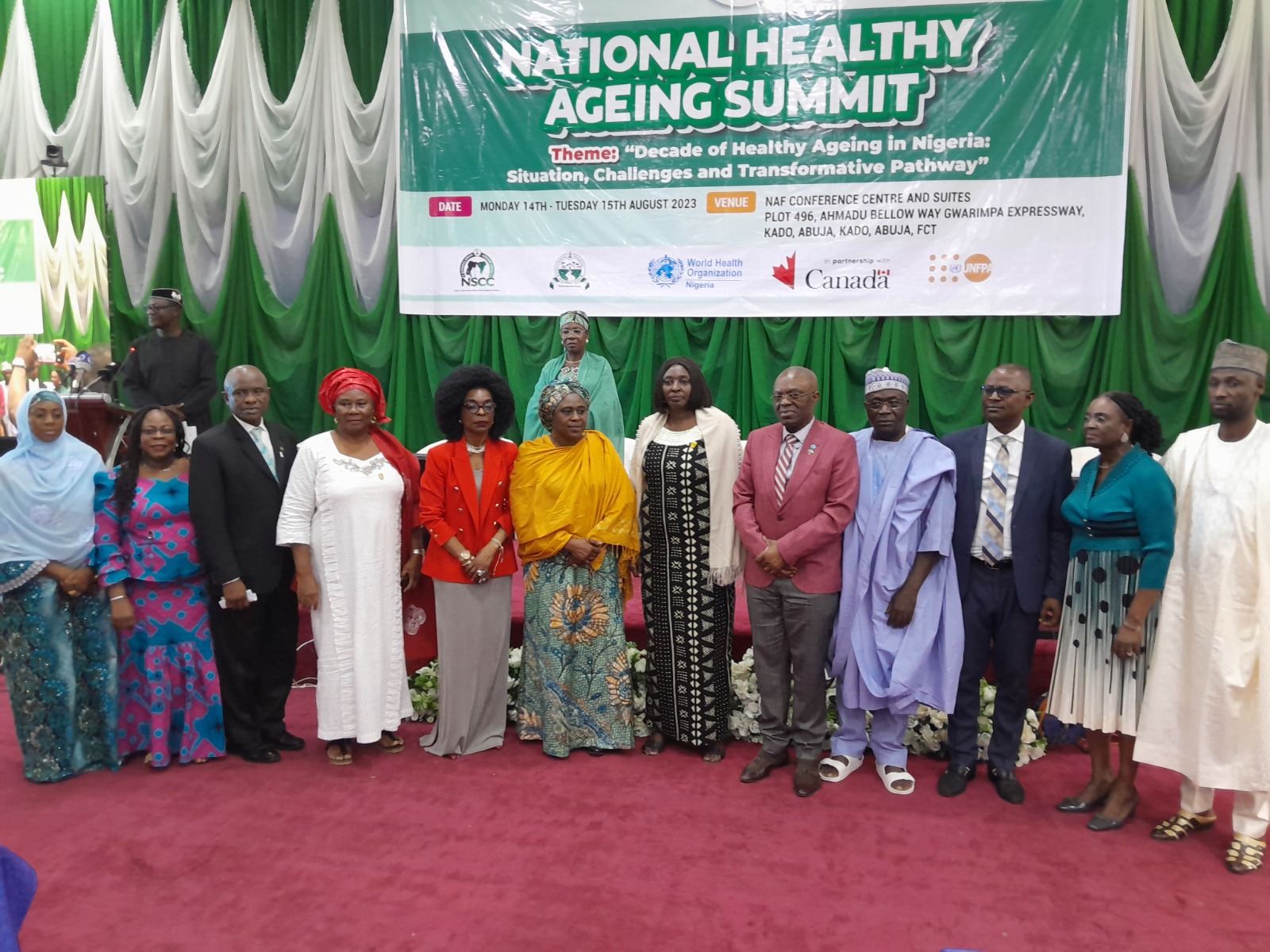The Senior Special Adviser to the President on Health, Dr. Salma Anas Ibrahim has disclosed that the renewed hope health agenda of President Bola Ahmed Tinubu is committed to cover over 50 million Nigerians and mostly vulnerable, including the elderly people within the next four years.
Anas-Ibrahim while disclosing this in her keynote address on Monday at the National Healthy Ageing Summit in Abuja, therefore, expressed optimism that that it is doable, as younger generations can tap the potentials and harness the contributions of all to achieve national development and socio economic growth of their country.
She said: “The renewed hope health agenda of President Bola Ahmed Tinubu is committed to cover over 50 million Nigerians and most of them vulnerable, including the elderly people within the next four years by the grace of God.”
“As I’m speaking to you today as a special adviser to the president, the president of the Federal Republic of Nigeria, President Bola Ahmed Tinubu, I want to reiterate to you that this is a critical stage in our lifetime in Nigeria, as we are transitioning to a new government of renewed hope and a renewed hope for health.:
“So I would like to say that the President is committed to ensure that we meet and realize our universal health care coverage, which also involve the health of the elderly people. No one will be left behind. Not an elderly person or any other person will be left behind.” She said.
She further disclosed that the agenda will recognize a critical component of the vulnerable group and will access quality health care services that covers all vulnerable groups including women and children, and also the disabled people.
“The elderly needs both social and psychological needs in addition to medical needs, as we also need to protect them from long term care, provide support and protection from abuse and discrimination.”
“These are things that are happening silently in our communities, but you know, as I said, elderly people, their voices continue to get low so they don’t complain.”
“So we need to raise their voices to be able to speak out when they are suffering because it is their believe that we in Nigeria and which is common in most African countries.”
She noted that Nigerians have extended family system and strongly feel that most of elderly are well protected by that system.
“But within that system, there are abuses. Just a few weeks ago, I had a lot of interaction with Nigerians in diaspora, and one of the key they brought out was abuses of the elderly.”
“They send money but it’s not being utilized for the needs to actually to meet the needs of their parents that are very elderly and live in here.”
“So they are looking at options should we start with what is happening in the western world where we can have guarantee that our parents or grandparents are being taken care of.”
“We need to start raising voices and prayer to create a mechanism that protects them within our extended family structures.” She added.
Also speaking, the WHO Representative in Nigeria, Dr Walter Kazadi Mulombo said Globally, there were 703 million persons aged 65 or over in 2019 adding that over the next three decades, the number of older persons worldwide is projected to more than double, reaching more than 1.5 billion persons in 2050.
He said, apart of Northern Africa and Asia, the second fastest increase is projected for sub-Saharan Africa, where the population aged 65 or over could grow from 32 million in 2019 to 101 million in 2050.
He noted that despite spare data on older persons, Nigeria is not spared from these alarming figures with about 14.8 million aged 60years and above.
He therefore call upon the Government of Nigeria to continue to exercise leadership and increased investment in human capital development to further strengthen partnership and prioritizing for the Decade of Healthy Ageing by focusing on improved engagement with older people;
“Better understanding of older peoples’ needs; developing and strengthening health and long-term care, specifically in communities and improved multisectoral action in aligning with the PHC system approach as we take opportunity of the recent PHC summit and its recommendations.”
“Advocate for continued capacity-building; evidence-based guidance; support to connect, convene and exchange knowledge with relevant stakeholders; and data and innovation at all levels to inform decision making and better coordination and serve as a tool to provide feedback to health service delivery managers and communities resulting in improvements in service provision for the older persons in integrated approach”. He added.
Meanwhile, the Director General of Senior Citizens Center, Dr. Emem Omokaro while speaking on the theme of the summit: “Decade of healthy ageing in Nigeria, situation Challenges and transformative pathway”, also disclosed that in Nigeria, disaggregated data from the Nigeria Living Standard Survey 2019 indicate a population of 14.8 million for older persons (NBS 2019) with a population growth rate of 2.8%.
Omokaro noted that in spite of its young pyramid structured population, Nigeria by 2050 will be home to 29.8 million older persons.
According to her, one of the implications of a growing ageing population, is the considerable and likely growing prevalence of Non Communicable Diseases (NCDs), chronic conditions and functional impairment among the older persons, substantially expanding the need for Long Term Care (LTC).
“However, global commitment to the development and popularization of international Policy frameworks and Plan of Actions including the Sustainable Development Goals 1, 2, 3 and 5, the WHO Global Strategy on Ageing and Health, The UN Decade of Healthy Ageing ( 2020 – 2030 ) as well as the Madrid International Plan of Action on Ageing (MIPAA) present opportunities for global dialogues, collaborations and actions to mitigate the implications of agcing for vulnerability and functional impairments and to promote plan of actions to devclop the capacities of national population to advance in health and wellbeing into old age.”
“These actions are designed to require whole of government and whole of society data driven response towards positive and transformative change of attitudes, behavioral, social, cultural and physical environments to promote healthy ageing and the alignment of health needs of older people, their families and communities to sustainable devclopment systems.”
“In partnership with Member states, WHO and other UN agencies are expected to lead implementation of the UN Decade of Healthy Ageing Strategy and serve as the Decade Secretariat with focus on four areas of action namely Age friendly Environments; Combating Ageism; Integrated Care and Long‘Term care with implications for identifying major research prioritics and devcloping data systems.” She added.
READ ALSO FROM NIGERIAN TRIBUNE
WATCH TOP VIDEOS FROM NIGERIAN TRIBUNE TV
- Let’s Talk About SELF-AWARENESS
- Is Your Confidence Mistaken for Pride? Let’s talk about it
- Is Etiquette About Perfection…Or Just Not Being Rude?
- Top Psychologist Reveal 3 Signs You’re Struggling With Imposter Syndrome
- Do You Pick Up Work-Related Calls at Midnight or Never? Let’s Talk About Boundaries







